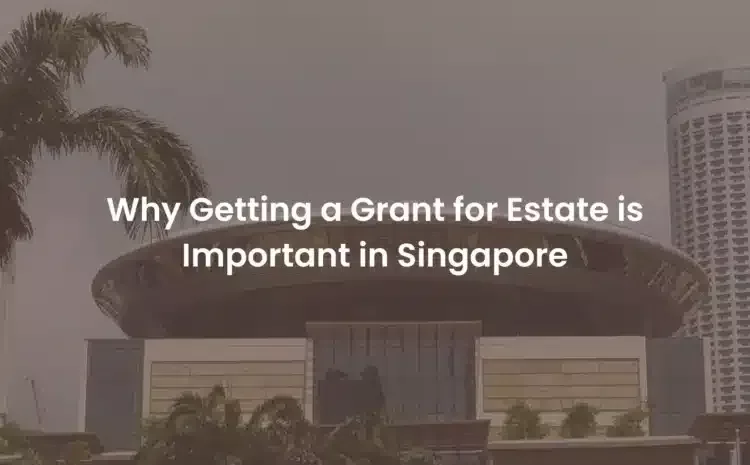Why Getting a Grant for Estate is Important in Singapore
Navigating the complexities of estate administration can be a daunting task, especially in a place as fast-paced and legally meticulous as Singapore. One crucial step in this process is obtaining a Grant of Probate or Letters of Administration. This legal requirement might seem like just another bureaucratic hoop to jump through, but it serves several important purposes that safeguard the interests of all parties involved. Here’s why getting a grant for an estate is so vital in Singapore.
1. Legal Authority to Administer the Estate
When a person passes away, their assets and liabilities don’t just automatically transfer to their heirs. A Grant of Probate (if there is a will) or Letters of Administration (if there is no will) is necessary to legally empower the executor or administrator to manage and distribute the deceased’s estate. Without this grant, banks, financial institutions, and other entities are unlikely to release the deceased’s assets to any party, preventing unauthorized access and potential misuse of the assets.
2. Protecting the Deceased’s Wishes
For individuals who have left behind a will, obtaining a Grant of Probate ensures that their last wishes are respected and carried out as specified. The grant confirms the validity of the will and the executor’s authority to act on it. This legal backing helps prevent disputes among beneficiaries and ensures that the distribution of the estate aligns with the deceased’s intentions.
3. Ensuring a Fair Distribution of Assets
In cases where there is no will, the Letters of Administration play a crucial role in ensuring a fair and orderly distribution of the deceased’s assets according to Singapore’s intestacy laws. These laws provide a clear framework for how assets should be divided among surviving family members, reducing the potential for conflict and ensuring that close relatives are provided for.
4. Streamlining the Administration Process
The process of obtaining a grant, while involving some paperwork and legal procedures, actually streamlines the administration of the estate. It creates a formal and structured approach to dealing with the deceased’s affairs, which can significantly reduce confusion and disputes among family members. With a grant in place, the executor or administrator has a clear mandate and can proceed with tasks such as paying off debts, closing bank accounts, and distributing assets more efficiently.
5. Safeguarding Beneficiaries’ Interests
One of the primary concerns in estate administration is the protection of beneficiaries’ interests. The legal requirement to obtain a grant ensures that the person handling the estate is accountable and operates under judicial oversight. This accountability helps to prevent fraud and mismanagement, giving beneficiaries peace of mind that their inheritance is being managed properly.
6. Facilitating Real Estate Transactions
In Singapore, real estate often constitutes a significant portion of an individual’s estate. Transferring property ownership without the necessary legal documentation is virtually impossible. A grant is essential for selling or transferring property from the deceased’s name to the beneficiaries. This legal requirement ensures that property transactions are conducted transparently and according to the law.
7. Compliance with Legal and Financial Regulations
Singapore’s legal and financial systems are stringent and thorough, ensuring that all transactions and administrative processes are above board. Obtaining a grant is a key part of this regulatory framework. It ensures that all actions taken with regard to the deceased’s estate comply with national laws and financial regulations, thus protecting the interests of all stakeholders and maintaining the integrity of the legal system.
Conclusion
In summary, obtaining a Grant of Probate or Letters of Administration is a crucial step in estate administration in Singapore. It not only provides legal authority to manage the estate but also ensures that the deceased’s wishes are honored, assets are fairly distributed, and beneficiaries’ interests are protected. This process, while potentially complex, ultimately serves to streamline the administration of the estate and ensure compliance with legal and financial regulations. For those navigating the aftermath of a loved one’s passing, understanding and securing this grant is essential for a smooth and fair resolution of the deceased’s affairs.

